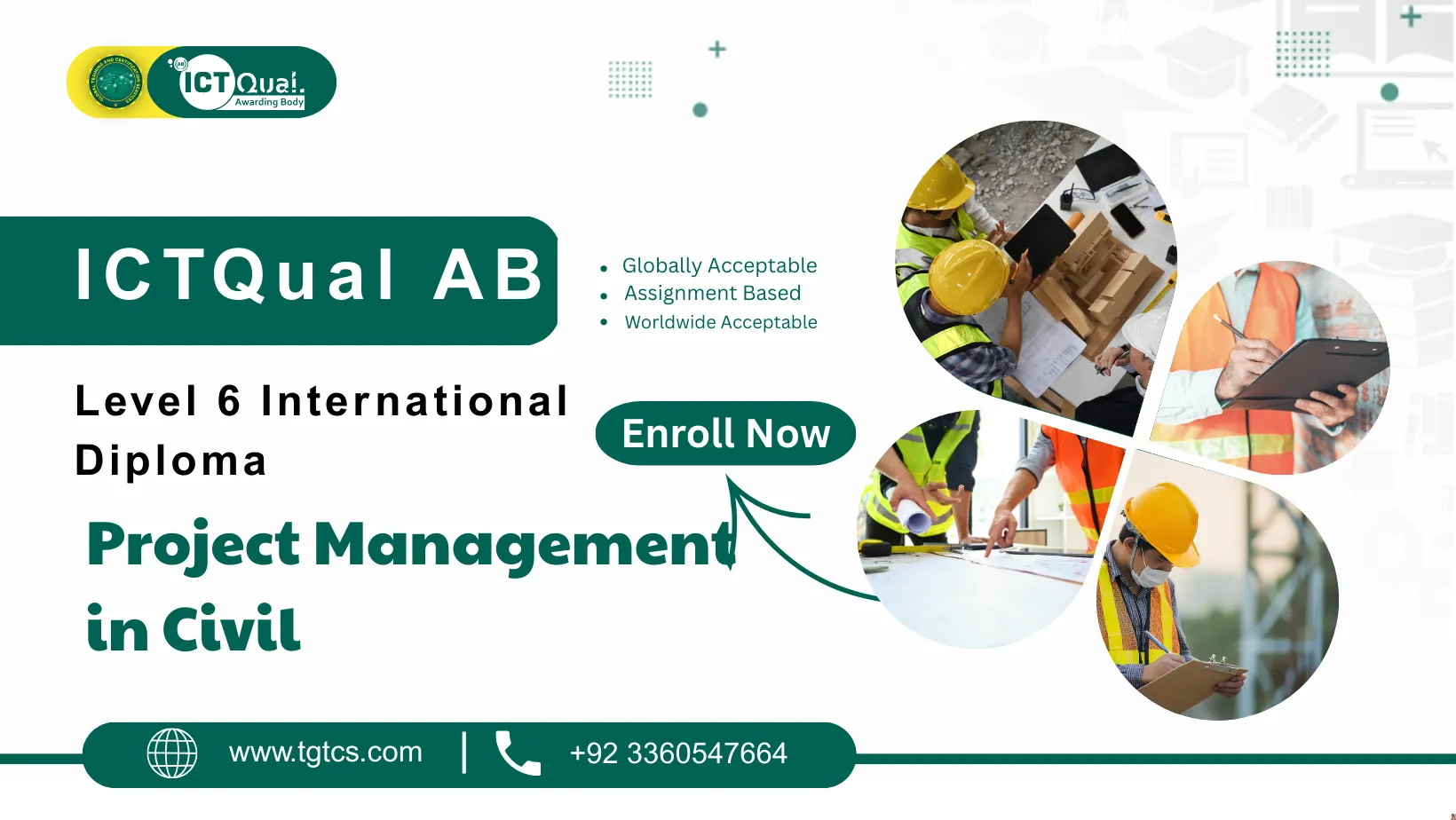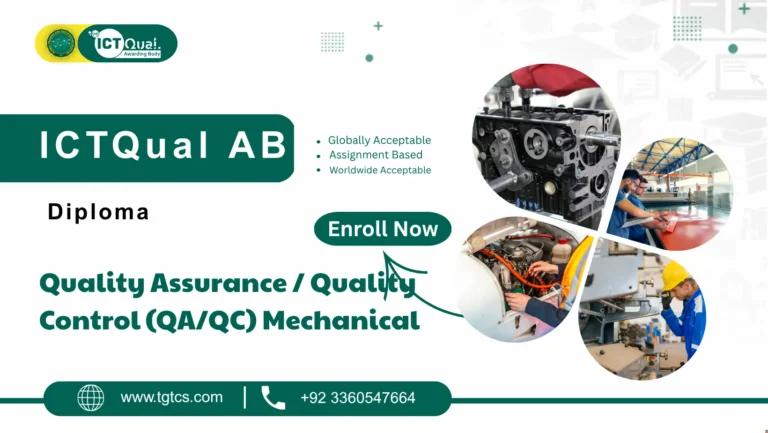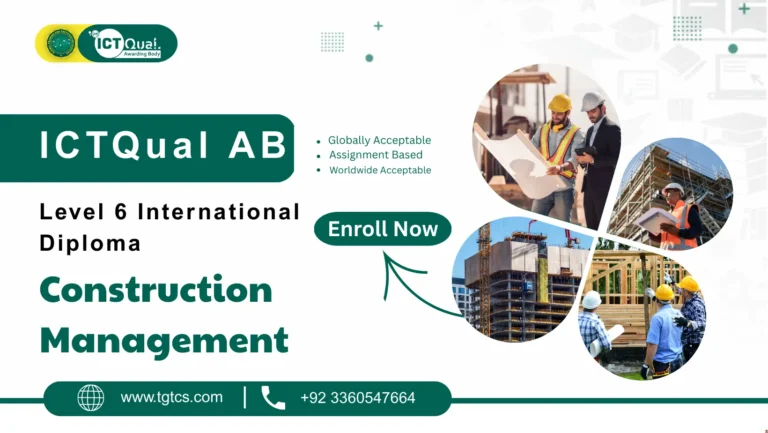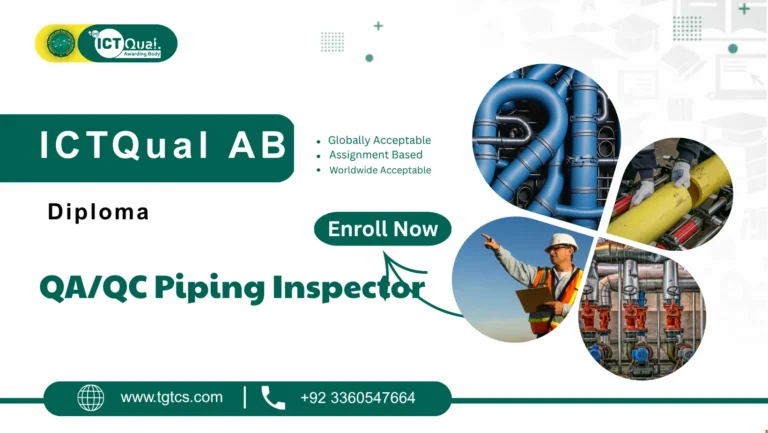ICTQual AB Level 6 International Diploma in Project Management in Civil
The construction and civil engineering industries are the backbone of global infrastructure development, and effective project management plays a vital role in their success. The ICTQual AB Level 6 International Diploma in Project Management in Civil is a prestigious and globally recognized qualification designed to equip learners with advanced knowledge, practical expertise, and strategic leadership skills needed to manage civil projects of varying scale and complexity.
This diploma provides a comprehensive framework covering all critical aspects of civil project management, including planning, scheduling, budgeting, quality control, compliance, risk management, and leadership. Learners will develop the ability to oversee large-scale infrastructure projects, manage multidisciplinary teams, and ensure compliance with international standards and safety regulations. The ICTQual AB Level 6 International Diploma in Project Management in Civil also emphasizes sustainability, digital tools in construction, and modern practices to meet the evolving demands of the industry.
Throughout this program, learners gain hands-on expertise in areas such as contract management, procurement, health and safety, project economics, and crisis management. The qualification not only enhances theoretical understanding but also focuses on real-world applications, preparing graduates to lead successfully in global construction and civil engineering environments.
By completing this course, professionals will significantly strengthen their career prospects, opening opportunities in multinational construction firms, infrastructure projects, government agencies, and consultancy roles. The ICTQual AB Level 6 International Diploma in Project Management in Civil is the ideal pathway for ambitious individuals aiming to excel as civil project managers, site leaders, and industry innovators.
The Global Training and Certification Services is Approved Training Centre of ICTQual AB UK Ltd
The ICTQual AB Level 6 International Diploma in Project Management in Civil is designed to provide learners with internationally recognized expertise in managing civil and construction projects.
Course Level and Credits
- Level 6 International Diploma, 360 credits.
- Designed for civil engineers, project managers, and aspiring professionals in construction leadership.
Mode of Study
- Fully assignment-based qualification.
- Flexible, self-paced study accessible from anywhere in the world.
Global Recognition & Attestation
- British Council verifiable, MOFA and Embassy attested.
- Ideal for international employment, professional credibility, and iqama approval in Gulf countries.
Suitability for Learners
- Fresh learners must complete 36 mandatory assignments within 3 years.
- Experienced professionals with 6+ years of relevant experience can fast-track the diploma by defending their knowledge in professional discussions with ICTQual AB-approved assessors.
Scope and Purpose
- Comprehensive coverage of civil project management, including planning, budgeting, risk control, and compliance.
- Prepares learners to manage large-scale construction projects and lead cross-disciplinary teams.
Skills and Knowledge Gained
- Expertise in project scheduling, cost estimation, procurement, and quality assurance.
- Strong leadership, risk management, and compliance knowledge tailored for civil projects.
Career Benefits
- Opens opportunities in multinational construction firms, government agencies, and infrastructure consultancies.
- Enhances employability for roles such as Civil Project Manager, Site Manager, and Construction Consultant.
Mandatory Unit
This qualification, the ICTQual AB Level 6 International Diploma in Project Management in Civil, consists of 36 mandatory units.
Year 1 – Foundation in Civil Project Management
- Principles of Project Management
- Introduction to Civil Engineering Projects
- Construction Materials and Methods
- Project Planning and Scheduling
- Risk Assessment and Management
- Health, Safety, and Environmental Awareness
- Project Communication and Stakeholder Management
- Construction Technology Fundamentals
- Financial Management in Projects
- Quality Assurance and Control
- Legal and Regulatory Frameworks in Construction
- Professional Ethics and Conduct
Year 2 – Intermediate Project Management and Civil Engineering Practices
- Advanced Project Planning Techniques
- Resource Management and Allocation
- Project Cost Estimation and Budgeting
- Civil Project Design Principles
- Contract Management in Construction
- Project Risk Analysis and Mitigation
- Leadership and Team Management
- Construction Site Management
- Sustainability and Environmental Management
- Project Monitoring and Reporting
- Problem-Solving and Decision-Making in Projects
- Communication and Negotiation Skills
Year 3 – Advanced Civil Project Management and Strategic Leadership
- Strategic Project Management in Civil Engineering
- Advanced Construction Project Design
- Infrastructure Project Management
- Innovation in Construction Projects
- Advanced Risk and Crisis Management
- Procurement and Supply Chain Management
- Leadership in Civil Engineering Projects
- Advanced Project Control and Performance Measurement
- Project Governance and Compliance
- Research Methods and Project Analysis
- Capstone Project in Civil Project Management
- Professional Development and Career Planning
By the end of the program, learners will demonstrate expertise in planning, executing, and leading civil engineering and construction projects in line with global standards.
Year 1 – Foundation in Civil Project Management
Principles of Project Management
- Understand the core concepts and methodologies of civil project management.
- Apply project life cycle principles to real-world construction projects.
- Evaluate the roles and responsibilities of civil project managers.
- Develop problem-solving skills for project planning and execution.
Introduction to Civil Engineering Projects
- Recognize the scope and impact of civil engineering projects globally.
- Identify the stages involved in delivering large-scale civil projects.
- Apply technical knowledge to construction project settings.
- Assess the role of civil engineering in infrastructure development.
Construction Materials and Methods
- Demonstrate knowledge of modern construction materials and techniques.
- Apply material selection criteria based on project specifications.
- Evaluate sustainability in construction material use.
- Understand testing and quality assurance methods for materials.
Project Planning and Scheduling
- Develop accurate project schedules using industry-standard tools.
- Apply critical path and Gantt chart techniques for civil projects.
- Monitor project progress against milestones.
- Adjust plans to address delays and resource constraints.
Risk Assessment and Management
- Identify potential risks in civil engineering projects.
- Apply risk assessment methodologies to minimize hazards.
- Develop mitigation and contingency strategies.
- Ensure compliance with health and safety standards.
Health, Safety, and Environmental Awareness
- Demonstrate knowledge of HSE standards in construction.
- Implement safety protocols to reduce workplace hazards.
- Promote environmental sustainability practices.
- Evaluate site-specific safety risks.
Project Communication and Stakeholder Management
- Develop effective communication strategies for civil projects.
- Manage relationships with contractors, clients, and stakeholders.
- Apply conflict resolution techniques in project settings.
- Prepare professional project documentation.
Construction Technology Fundamentals
- Understand emerging construction technologies and their applications.
- Apply innovative tools to improve project outcomes.
- Evaluate the role of digital tools in civil project management.
- Integrate BIM and smart technologies into project workflows.
Financial Management in Projects
- Apply budgeting techniques to civil project planning.
- Monitor project financial performance against KPIs.
- Understand funding and financial risk in construction projects.
- Use cost-benefit analysis for decision-making.
Quality Assurance and Control
- Develop quality assurance frameworks for construction projects.
- Apply control methods to ensure compliance with standards.
- Monitor performance through auditing and inspection.
- Evaluate continuous improvement methods in project quality.
Legal and Regulatory Frameworks in Construction
- Understand construction laws and compliance requirements.
- Apply legal frameworks to project contracts and obligations.
- Recognize the role of regulatory bodies in civil projects.
- Analyze ethical considerations in construction law.
Professional Ethics and Conduct
- Demonstrate professional integrity in civil project management.
- Apply codes of conduct in leadership and decision-making.
- Recognize ethical dilemmas in project environments.
- Promote responsible and sustainable practices.
Year 2 – Intermediate Project Management and Civil Engineering Practices
Advanced Project Planning Techniques
- Apply advanced scheduling and planning tools to large projects.
- Optimize resource allocation for efficiency.
- Evaluate multi-project scheduling challenges.
- Integrate agile and lean project management techniques.
Resource Management and Allocation
- Assess resource needs for complex civil projects.
- Allocate labor, equipment, and materials effectively.
- Monitor resource utilization to reduce waste.
- Apply strategies for managing limited resources.
Project Cost Estimation and Budgeting
- Develop accurate cost estimates for construction projects.
- Apply budgeting techniques in civil project contexts.
- Monitor project expenditures against planned budgets.
- Analyze cost overruns and propose corrective actions.
Civil Project Design Principles
- Understand the fundamentals of civil project design.
- Apply design principles to ensure functionality and safety.
- Evaluate design efficiency through case studies.
- Integrate sustainability into civil project design.
Contract Management in Construction
- Develop and manage construction contracts effectively.
- Understand contractual obligations and dispute resolution.
- Apply FIDIC and international contract standards.
- Ensure compliance with legal and ethical requirements.
Project Risk Analysis and Mitigation
- Conduct detailed risk analysis for civil projects.
- Develop proactive risk mitigation strategies.
- Implement monitoring frameworks for risk control.
- Evaluate project resilience against crises.
Leadership and Team Management
- Apply leadership theories in civil project settings.
- Build effective and motivated project teams.
- Resolve conflicts and enhance collaboration.
- Promote diversity and inclusion in project environments.
Construction Site Management
- Manage day-to-day operations at construction sites.
- Apply safety and quality standards in site management.
- Monitor productivity and progress against plans.
- Implement site logistics for efficiency.
Sustainability and Environmental Management
- Apply sustainable practices in civil projects.
- Evaluate environmental impact assessments.
- Integrate green building standards into projects.
- Develop long-term sustainability strategies.
Project Monitoring and Reporting
- Apply KPIs for effective project monitoring.
- Prepare accurate progress reports for stakeholders.
- Use project management software for tracking.
- Identify delays and apply corrective measures.
Problem-Solving and Decision-Making in Projects
- Apply structured problem-solving techniques.
- Make informed decisions under uncertainty.
- Evaluate alternative project solutions.
- Promote evidence-based decision-making.
Communication and Negotiation Skills
- Develop advanced communication skills for projects.
- Apply negotiation strategies in contracts and procurement.
- Resolve conflicts through professional dialogue.
- Enhance stakeholder relationships with effective communication.
Year 3 – Advanced Civil Project Management and Strategic Leadership
Strategic Project Management in Civil Engineering
- Apply strategic thinking to civil project planning.
- Align projects with organizational goals.
- Manage portfolio-level civil projects.
- Evaluate global trends in civil project management.
Advanced Construction Project Design
- Apply advanced design tools for infrastructure projects.
- Integrate sustainability and safety into designs.
- Evaluate feasibility of complex construction designs.
- Implement innovative approaches in civil design.
Infrastructure Project Management
- Manage large-scale infrastructure projects effectively.
- Apply advanced scheduling and resource planning techniques.
- Monitor infrastructure performance and compliance.
- Evaluate social and economic impacts of infrastructure projects.
Innovation in Construction Projects
- Apply innovative technologies in construction processes.
- Promote digital transformation in project management.
- Integrate BIM, AI, and smart tools in civil projects.
- Evaluate case studies of innovation in construction.
Advanced Risk and Crisis Management
- Develop crisis management strategies for large projects.
- Conduct advanced risk assessments.
- Implement crisis communication frameworks.
- Evaluate organizational resilience during crises.
Procurement and Supply Chain Management
- Apply procurement strategies in civil projects.
- Manage vendor relationships and contracts.
- Optimize supply chain processes.
- Ensure compliance with international procurement standards.
Leadership in Civil Engineering Projects
- Demonstrate strategic leadership in civil projects.
- Inspire and motivate multidisciplinary teams.
- Apply change management strategies.
- Build ethical and professional leadership styles.
Advanced Project Control and Performance Measurement
- Monitor performance using advanced KPIs.
- Apply earned value management techniques.
- Conduct benchmarking studies.
- Implement continuous improvement strategies.
Project Governance and Compliance
- Apply governance frameworks in project management.
- Ensure compliance with civil project regulations.
- Promote transparency and accountability.
- Evaluate governance models in construction projects.
Research Methods and Project Analysis
- Apply qualitative and quantitative research methods.
- Conduct independent research in civil project contexts.
- Analyze data for informed project decision-making.
- Prepare professional-level research reports.
Capstone Project in Civil Project Management
- Apply knowledge and skills in a real-world project.
- Demonstrate independent project planning and execution.
- Analyze project outcomes against objectives.
- Present findings in a professional report.
Professional Development and Career Planning
- Develop strategies for career advancement in civil management.
- Build professional portfolios for global employability.
- Apply lifelong learning and continuous improvement.
- Evaluate personal strengths and areas for growth.
The ICTQual AB Level 6 International Diploma in Project Management in Civil is designed to empower learners with advanced skills, global recognition, and practical expertise to excel in the civil engineering and construction management sector.
Global Recognition and Verifiability
- British Council verifiable, ensuring credibility worldwide
- MOFA and Embassy attestation makes it valid for international career growth
- Highly recognized for job applications and Iqama approval in the Gulf region
Flexible Learning Pathways
- 360-credit assignment-based diploma, designed for self-paced learning
- Complete from anywhere in the world with no physical attendance required
- Opportunity for experienced professionals to gain certification through recognition of prior experience and professional discussions
Career Advancement Opportunities
- Enhances employability in civil project management and construction industries
- Opens pathways for senior-level roles in project leadership, planning, and resource management
- Boosts professional profile for opportunities in both local and international markets
Practical Knowledge and Skills Development
- Learn essential skills in construction planning, cost estimation, and site management
- Gain expertise in quality control, legal frameworks, and sustainability practices
- Build strong leadership, communication, and stakeholder management capabilities
Suitable for Fresh and Experienced Learners
- Fresh candidates gain in-depth knowledge through 36 mandatory assignments
- Experienced professionals can achieve certification faster with at least 6 years of verifiable experience and assessor-led discussions
- A balanced pathway tailored to different learner needs
The ICTQual AB Level 6 International Diploma in Project Management in Civil offers unmatched flexibility, global recognition, and advanced project management expertise.
The ICTQual AB Level 6 International Diploma in Project Management in Civil is designed to suit a wide range of learners, from aspiring graduates to experienced civil engineering professionals. T
Fresh Civil Engineering Graduates
- Ideal for those who have recently completed their civil engineering studies and want to gain advanced project management expertise.
- Equips them with the industry-relevant knowledge and skills needed to secure job opportunities in construction and infrastructure projects.
Experienced Civil Engineers
- Suitable for professionals with at least six years of verifiable civil project experience who want to fast-track their certification.
- Provides recognition of prior experience through professional discussion assessments with ICTQual AB-approved assessors.
Project Managers in Civil Construction
- Designed for individuals already managing construction projects who want to strengthen their credentials.
- Enhances leadership, planning, and risk management capabilities to progress into senior project management roles.
Professionals Seeking International Opportunities
- Best for candidates aiming for overseas jobs where British Council verifiable, MOFA and Embassy-attested certification is required.
- Increases employability across global civil engineering markets, especially in the Gulf region.
Career Changers into Civil Project Management
- Suitable for individuals from related fields like architecture, surveying, or mechanical engineering wanting to shift into project management in civil engineering.
- Offers comprehensive knowledge in project planning, construction management, and quality control to support a successful career transition
Course Overview
Course Level
Level 6
Course Units
36 Units
Credits
360
Duration
3 years






